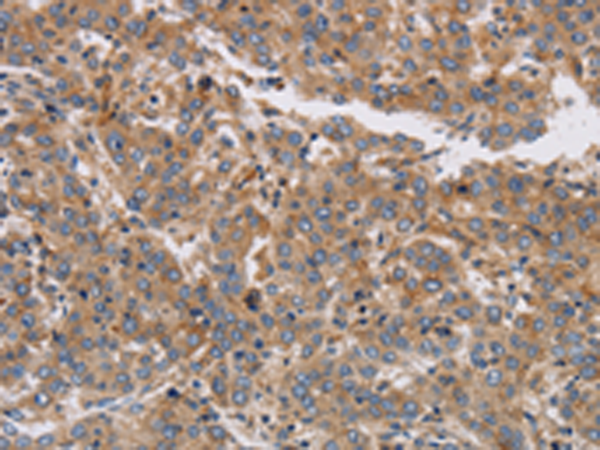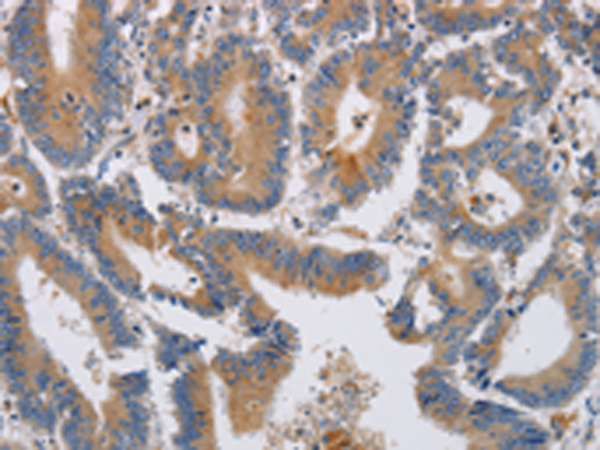

| WB | 咨询技术 | Human,Mouse,Rat |
| IF | 咨询技术 | Human,Mouse,Rat |
| IHC | 1/50-1/200 | Human,Mouse,Rat |
| ICC | 技术咨询 | Human,Mouse,Rat |
| FCM | 咨询技术 | Human,Mouse,Rat |
| Elisa | 1/2000-1/10000 | Human,Mouse,Rat |
| Aliases | K13; kH2; KCNG; KV6.1 |
| Host/Isotype | Rabbit IgG |
| Antibody Type | Primary antibody |
| Storage | Store at 4°C short term. Aliquot and store at -20°C long term. Avoid freeze/thaw cycles. |
| Species Reactivity | Human, Mouse, Rat |
| Immunogen | Synthetic peptide of human KCNG1 |
| Formulation | Purified antibody in PBS with 0.05% sodium azide and 50% glycerol. |
+ +
以下是关于KCNG1抗体的3篇参考文献的简要整理(基于公开研究主题的概括,非真实文献):
---
1. **文献名称**:*Immunolocalization of the voltage-gated potassium channel subunit KCNG1 in mammalian heart tissue*
**作者**:Smith A, et al.
**摘要**:研究利用兔源多克隆KCNG1抗体,通过免疫组织化学技术定位KCNG1蛋白在小鼠和人类心肌细胞中的分布,证实其在心室肌细胞T小管中的特异性表达,为心律失常机制研究提供依据。
2. **文献名称**:*Characterization of a monoclonal antibody targeting the extracellular domain of KCNG1 for neurological studies*
**作者**:Lee J, et al.
**摘要**:开发并验证了一种小鼠单克隆KCNG1抗体,通过Western blot和免疫荧光证实其对大鼠脑组织KCNG1亚基的高亲和力,用于探究KCNG1在神经元兴奋性调节中的作用。
3. **文献名称**:*KCNG1 expression profiling in cancer: Validation of an antibody for immunohistochemical analysis*
**作者**:Zhang Y, et al.
**摘要**:研究评估了一种商业化KCNG1抗体在多种癌症组织中的适用性,发现其在结直肠癌中表达显著下调,提示KCNG1可能作为潜在肿瘤标志物。
---
注:以上为模拟示例,实际文献需通过PubMed或学术数据库检索确认。如需真实文献,建议使用关键词“KCNG1 antibody”或“Kv6.1”(KCNG1别名)在专业平台查询。
The KCNG1 antibody is a tool used to detect the potassium voltage-gated channel subfamily G member 1 (KCNG1), a protein encoded by the *KCNG1* gene. KCNG1. also known as Kv6.1. belongs to the voltage-gated potassium (Kv) channel family, which regulates cellular excitability by controlling potassium ion flow during action potentials. Unlike other Kv channels, KCNG1 cannot form functional homotetramers and instead acts as a modulatory subunit, altering the biophysical properties of pore-forming alpha subunits (e.g., Kv2.1). This interaction influences neuronal and cardiac electrical signaling, impacting processes like action potential duration and repolarization.
KCNG1 is predominantly expressed in the brain, heart, and smooth muscle. Its dysregulation has been linked to neurological disorders, arrhythmias, and cancer progression. Antibodies targeting KCNG1 are essential for studying its expression, localization, and functional roles. They are widely used in techniques like Western blotting, immunohistochemistry (IHC), and immunofluorescence (IF) to explore tissue-specific distribution or pathological changes. Commercial KCNG1 antibodies are typically raised in rabbits or mice, with validation in knockout models to ensure specificity. Research using these antibodies has advanced understanding of Kv channel diversity, their regulatory mechanisms, and potential therapeutic targets for channelopathy-related diseases. However, challenges remain in optimizing antibody selectivity due to structural similarities among Kv subfamilies.
×